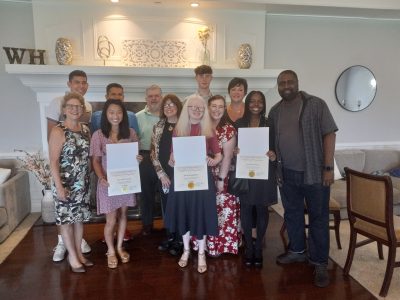White Plains Students Honored for Essays on Challenges in a Digital World
News Based on facts, either observed and verified directly by the reporter, or reported and verified from knowledgeable sources.

Adults of a certain generation are often critical of the ills of technology even as they spend too much time on their mobile devices.
But how about the perspectives of high school students who are coming of age and never experienced a world that hadn’t been dominated by social media platforms and other digital avenues.
The White Plains Democratic Committee on Sunday celebrated the five winners of its third annual Essay Writing Contest, a competition that was open to any student who lives or goes to school in White Plains. The 38 entrants all had to write their essay addressing this year’s question: As you are learning to be a “Digital Citizen” in the 21st century, what are your major challenges?
The competition had special meaning for first-place finisher Nuala Stanghellini, who just completed her junior year at White Plains High School. Stanghellini is legally blind, and while she uses assistive technology, she said her biggest challenge has been understanding from the rest of the digital community and keeping up with constantly evolving technology.
As someone who is supportive of other challenged individuals, she said being named the top essayist in the contest can hopefully open a few eyes.
“I was just really happy to advocate for other people,” said Stanghellini, who received the top prize of $750. “I was happy when I was honored because my essay was seen. If someone who’s in a position of power to make a positive different read it and (is) listening to my perspective, I was very excited about that.”
Judging was based on a scoring system used by the seven judges on the Essay Committee, which looked at specific sets of criteria, said Ellen Berger a Whtie Plains Democratic district leader who chaired the Essay Committee. Ideas and content, quality of reasoning, creativity and originality, quality of writing and structure and organization were all considered when evaluating the entries.
There were three students who finished in a tie for second, based on the point system – new White Plains High School graduate Nurashau Blount, Lily Onorato and David Davitt. Onorato and Davitt have both completed their junior year at White Plains High School and Stepinac, respectively. Each received $300.
Brandon Reyes, a just-graduated White Plains High School graduate, finished third and received $300 for his efforts.
All the winners were treated to a lunch on Sunday afternoon at the Westchester Hills Golf Club.
Blount said she entered the contest because as someone who is on social media all the time, the ability to discern the truth is challenging and time consuming.
“There’s so many different narratives sometimes; sometimes you have to do a lot of digging before you can get to the actual truth,” said Blount who will be attending Hampton University where she will study biology. “That’s the most difficult part, and also, time management. Just like scrolling all the time is always something I have to consciously tell myself to stop doing.”
Last year as a sophomore when Davitt entered the contest, the essay question focused on the biggest problem of their generation. Davitt, who finished third last year, had argued that it was social media. When he saw this year’s question, he had to try again.
While propaganda has always been a problem, the ease of publishing content is alarming, he said. For Davitt, the constantly changing digital landscape is most challenging.
“I mean, at Stepinac, we’re almost completely digitalized,” Davitt said. “So we use completely online curriculum, and stuff like that, so that was a big adjustment for me. Writing on a tablet and not writing in a notebook, sometimes I thought that was hard to adjust to.”
Berger said the committee decided on posing a question about challenges with the digital landscape after an overwhelming number of last year’s respondents argued that social media was the biggest problem of their generation.
“The other thing is how concerned they are about finding the truth and how difficult it is and how important it is,” Berger said.

Martin has more than 30 years experience covering local news in Westchester and Putnam counties, including a frequent focus on zoning and planning issues. He has been editor-in-chief of The Examiner since its inception in 2007. Read more from Martin’s editor-author bio here. Read Martin’s archived work here: https://www.theexaminernews.com/author/martin-wilbur2007/
